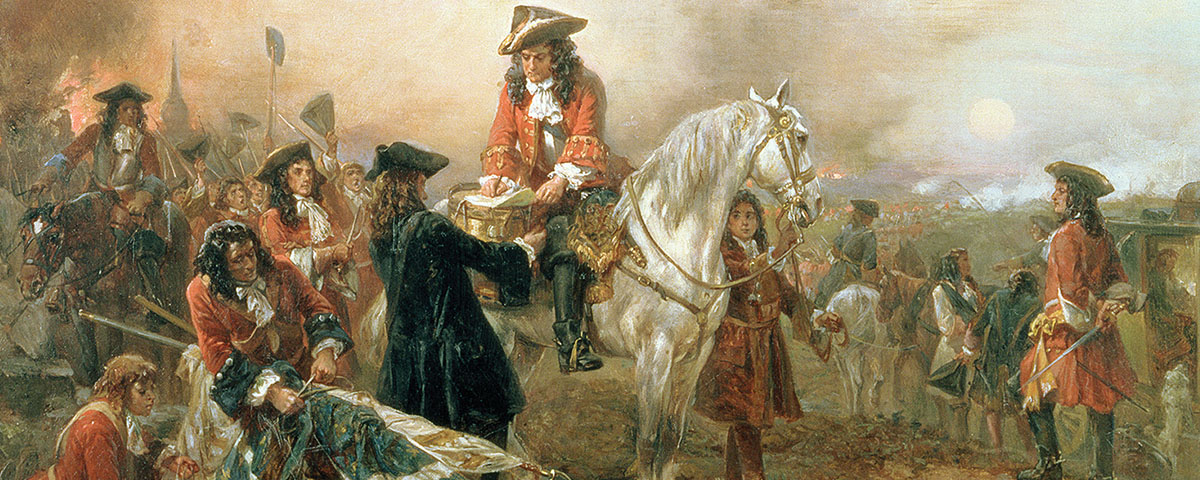“This day I conquer or die.” Thus spoke English Capt. Gen. John Churchill (1650–1722), duke of Marlborough and distinguished ancestor of future British Prime Minister Winston Churchill. He uttered those words on Aug. 13, 1704, as he rode to battle at Blenheim in the Holy Roman electorate of Bavaria (present-day southeast Germany).
The occasion was Churchill’s attack on the French army and its Bavarian allies in a gamble to preserve Hapsburg rule over the Holy Roman empire during the War of the Spanish Succession. Aiding Marlborough was imperial Gen. Prince Eugene of Savoy. Marking the first major defeat of the French in more than a half-century, their victory spared the imperial capital at Vienna, knocked Bavaria out of the war and preserved the alliance of England, Austria and the Netherlands. As historian Charles Spencer notes, it was the greatest land victory on foreign soil won by an English general since Henry V at Agincourt in 1415. In the words of poet Robert Southey, “’twas a famous victory.”
The allies sought to prevent a union of the French and Spanish crowns and thus preserve the balance of power in Europe. Fearing the war might be lost in the German empire before it could be won in Flanders, Marlborough disengaged his army and marched 250 miles to unite with imperial forces. Marlborough’s English, Scottish, Hessian and Hannoverian Redcoats impressed all with their discipline. Joining them on the battlefield (near present-day Blindheim, on the Danube River north of Augsburg) were allied contingents of Prussian, Dutch, Danish and Austrian troops. Marlborough and Eugene’s allied army of 52,000 faced nearly 60,000 French and Bavarian troops under Camille d’Hostun, comte de Tallard, who did not expect his numerically inferior foe to attack. The French deployed behind the Nebel River tributary, their right wing (36,000 men under Tallard) on the Danube at Blenheim, their left (24,000 men under Marshal Ferdinand de Marsin and Maximilian II Emanuel, elector of Bavaria) on hilly ground at Lutzingen.
Eugene and 16,000 troops opened the battle with a diversionary assault on Marsin and Maximilian, while Marlborough led 36,000 men on two unsuccessful assaults against Blenheim. Tallard had to call up reserves to defend the town, weakening the French center. As Eugene kept Marsin and Maximilian occupied, Marlborough thrust across the Nebel. His cavalry ultimately broke through, dividing Marsin and Maximilian from Tallard before sweeping the latter’s men into the river. Tallard and many of his men fell prisoner even as Marsin and Maximilian withdrew from the field.
The allies suffered more than 12,000 casualties, but inflicted some 13,000 on the enemy, while capturing another 14,000 men. Blenheim was a stupendous victory over absolutism and proved the armies of the French “Sun King” Louis XIV were not invincible. It also began the victorious association of Marlborough and Eugene, who continued to harry the French throughout the war. In one of history’s delicious ironies, Germany’s imperial First Reich was given another century of life by an ancestor of the man who two centuries later worked tirelessly to destroy the Third Reich.
Humility helps. The overconfidence of the French—who under-estimated Marlborough and rested on their laurels after a half-century of victory—was a recipe for disaster.
Planning matters. Marlborough’s superior planning and logistics enabled him to seize the strategic initiative from the French and inflict on them a decisive tactical attack.
Fight in concert. The close cooperation and coordination of the allied forces, especially on the battlefield, overcame their numerical inferiority.
Defeats deter. The French were thereafter reluctant to take the war to Germany and Austria.

